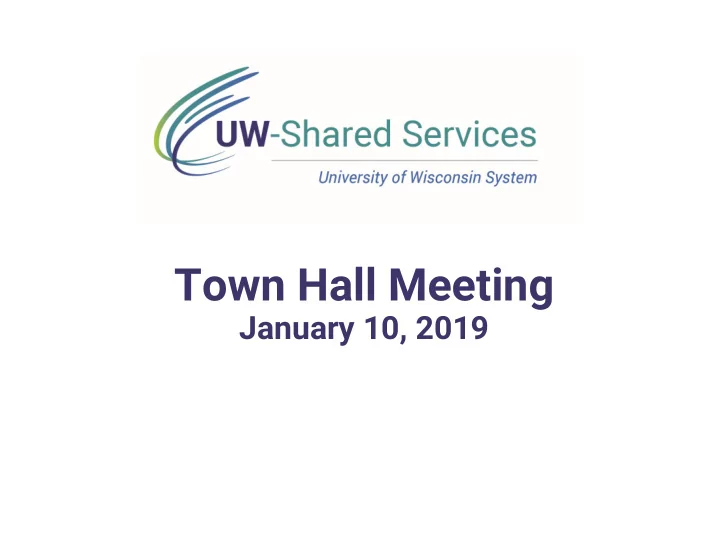

Town Hall Meeting January 10, 2019
Agenda 1. Definitions & Taxonomy A. Functions, Sub-functions & Services B. Service Forms 2. Service Development Lifecycle A. Process B. Roles 3. Service Frameworks A. Participation Model B. Finance Model 4. Q&A
Definitions & Taxonomy
Definition: Service A service should be: HR Examples: B ounded in terms of a definable scope Complaint Investigation A ssessable in how progress or success is measured Compliance Training R ecognizable to practitioners in the field Payroll Audit N eeded by customers or the University as a whole Leave S pecific in the desired outcome or goal Reporting
Shared Services Taxonomy Human Function Resources Sub Compensation Benefits Employee Functions Administration Administration Relations One-time Payroll Error Time & Leave Services Payments Reporting Reporting Activities & XXX XXX XXX Processes XXX XXX
Shared Services Forms Transactions - Performing a series of actions and interactions for the benefit of a customer (i.e. payroll, benefits processing) Standards - Maintaining a set of policies, principles, practices, and procedures to ensure consistency and repeatability (i.e. procedures for developing an RFP) Training - Educating users across the University of Wisconsin System how to perform a particular action or behavior (i.e. compliance training, diversity training) Support - Responding to a customer’s specific needs ( i.e. Help Desk support, Call Center) Technology - Providing a set of technology systems and tools to support or manage a service ( i.e. learning management tool, collaboration tool )
Definitions: Councils Group of 6 senior leaders from the UW comprehensive campuses (3 Provosts, 3 CBOs) charged with providing input and feedback on Customer Council customer satisfaction, service offerings, and service design and delivery. General name for a group of institution-based function or sub- function leaders, such as: SME Council • CIOs • HR Directors (Subject Matter Expert Council) • Procurement Directors • Controllers, etc.
Service Development Lifecycle
DRAFT
Process Flow – Full Could be used in cases of NEW Services with MANDATORY participation
Process Flow – Full Could be used in cases of NEW Services with MANDATORY participation
Process Flow – Express Could be used in cases of TECHNICAL or MINOR UPDATES to existing services
Service Frameworks
Participation Models All services Any comprehensive campus, UWSA, assumed to be Optional Optional unless UW-Madison, or UW-Milwaukee determined may opt to receive services otherwise President and VP-Admin Each comprehensive campus and approval Mandatory UWSA will receive this service required to make exclusively from UW-Shared Services services Mandatory There are rare instances where all campuses and UWSA, including UW-Madison and UW- Note: Milwaukee, are mandatory participants in a shared service. Those decisions are typically the result of other processes, such as CSRG. Agenda Item: Service Frameworks
Determining Mandatory Participation UW-Shared Services will evaluate every service on an combination of three criteria to identify whether there is a rationale for Mandatory Participation. OPTIONAL MANDATORY 5.0 3.0 1.0 2.0 4.0 Services on the lower end suggest ..while the higher end suggests Optional may be the best model… that Mandatory could be used R isk Scale Complexity • Severity: how severe is • Level of Fixed Costs • Deviations in campus the risk • Ability to reduce policies & practices • Probability the service Variable Costs • Difficulty in handling can reduce the risk • Likelihood of campuses deviations & exceptions • Likelihood of impact opting-in voluntarily • Ability to standardize
Funding Model Types Use of UW-Shared Services internal resources to BASE provide a service, with cost fully borne by UW- Shared Services. No chargeback to customers. Use of fees charged to provide a service, with CHARGEBACK cost fully borne by customers. No use of base funding. Use of base funding to cover a portion of the cost BLENDED to provide a service, with the remainder of the cost borne by customers.
Recommending a Funding Model Incentive Encourage Consumption Internalize Costs CHARGEBACK BLENDED Base Funding + Campus Transactional Fees Chargeback High Low • Charge customers based on • Base fund fixed costs, charge transaction cost and their usage customers for variable costs rate (e.g., $ per transaction) • Results in lower chargeback rates Tracking Cost • Full chargeback model Variable Cost to customers Cost CHARGEBACK BASE Campus Assessment Base Funding • Allocate cost to customers based • UW-Shared Services internally base on some operational metric fund the entire service unrelated to transaction cost • No chargeback to customers Low High (e.g., $ per FTE) • Full chargeback model Optional Mandatory Participation
Q&A S teve Wildeck, Executive Director Werner Gade, Director, Information Technology & CIO Jason Beier, Director, Human Resources Diann Sypula, Director, UW Service Center Rhonda Loger, Director, Procurement
Feedback feedback@uwss.wisconsin.edu Today’s Slides Available uwss.wisconsin.edu
Recommend
More recommend